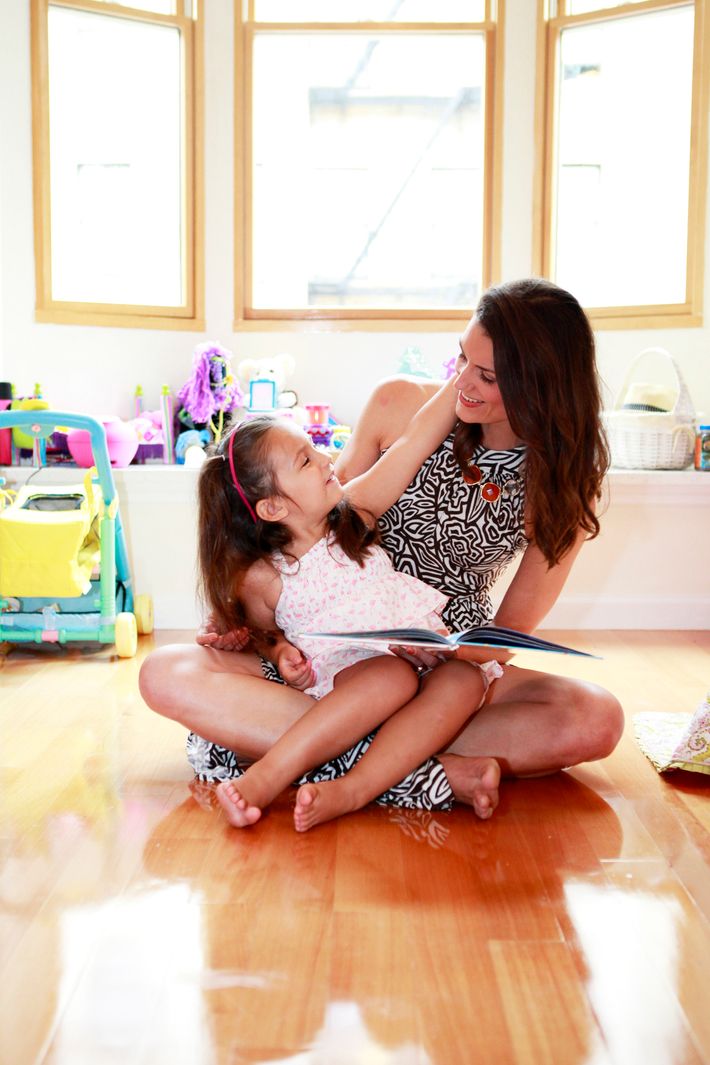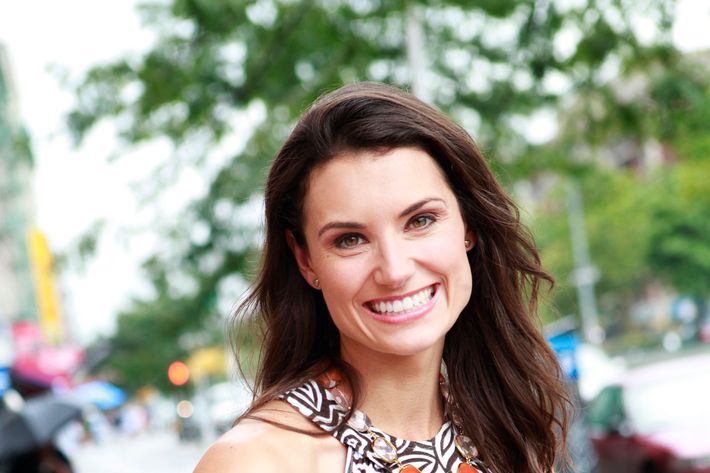Article: After the Scandal: Krystal Ball’s Transparent Life
The Cut, August 22, 2012, By Molly Fischer
Krystal Ball was talking to retirees in rural Virginia when her congressional campaign got weird.
She had just given her stump speech and completed a Q&A. “I looked at my phone, and I had a text message from my husband. And he said, ‘Everything’s fine. But after you’re done there, don’t talk to anyone, don’t check your e-mail, don’t call anyone, just call me immediately. And you may want to be alone. Like, not even with your staffers.’”
This did not sound to Ball like everything was fine. She wrapped up the event, went outside, and called her husband.
“He says, ‘Everything really is fine, but there’s some pictures that came out. Do you remember a party that you went to — ’ and he starts describing them.”
The photos showed Ball wearing a Santa hat with a black bustier at the age of 22.
In her hands were a festive Solo cup and a leash attached to a young man, who wore antlers on his head and a Rudolph-red dildo on his nose. In some of the especially hilarious photos, Ball and her companions fellated the dildo nose.
When her husband texted, the pictures were only on a local conservative blog, but it seemed unlikely they would stay there for long.
Ball’s campaign had always been a long shot: She was a 28-year-old Democrat running against a Republican incumbent in Virginia’s conservative-leaning first district. And if it hadn’t been for those “XXX-Mas” party photos, she might have remained a 2010 congressional also-ran, waiting in obscurity for the next election year. Instead, the photos made their way into the national media — and Ball responded forcefully, acknowledging the pictures and denouncing sexual double standards. She ended up with regular guest spots on Fox News and MSNBC, and now, two years later, she’s one of four co-hosts on MSNBC’s new daytime show The Cycle.
Sex and scandals sell, particularly when the subjects are young and attractive — this is not news. But what makes Ball’s story interesting is that it demonstrates the power of transparency. She’s staked her career on the belief that personal disclosures aren’t incompatible with professional legitimacy.
“I find it so astonishing how poorly a lot of politicians handle negative whatever in the press,” she says. “You have to just get it all out there. You have to be totally, uncomfortably honest.”
That’s her strategy, and so far it’s working.
“It was clearly intended to be a source of shame for me,” Ball says now of the photo debacle. “That was the intent, to shame me, to make me feel embarrassed, to make me want to give up. And instead, they gave me something that I actually feel really proud of, and that ended up being a platform and a stepping stone for me to go on and have even a larger voice.”

Ball tells the story of the fateful text over guacamole at a Mexican restaurant near her Hamilton Heights apartment. The guac is prepared tableside in a stone bowl shaped like a pig, and Ball mentions that her family has “an unusual affinity for pigs.” Her 4-year-old daughter Ella’s nickname is “Piglet.”
“The first night home she literally nursed for, like, eight hours,” Ball explains. “Maybe this is TMI, I don’t know, but my milk hadn’t fully come in yet. My body was like, ‘Oh my god, you had triplets.’ It was insane. I was like a dairy.”
This summer, as Ball solidified her commitment to MSNBC, her family signed the lease on a new apartment and made plans to stay in New York for the near future. Ball is starting to establish a routine: Typically she leaves home at 8:30, is in the office at 9:00, films the show at 3:00 pm, and following a little bit of post mortem, gets back home by 5:00. She’ll have dinner with her husband and Ella. Then often she goes back to work after Ella is in bed and does a guest appearance on one of the prime-time shows.
Ball has the clean, forthright appeal of a star athlete, which she was: She went to Clemson as a Division-I swimmer before quitting varsity sports and transferring to the University of Virginia to focus on academics. She still has a swimmer’s strong shoulders and narrow waist.
On camera, Ball is opinionated but also polite, which matches the show’s overall tone — more college seminar than cable shouting match. Token conservative S.E. Cupp takes some ribbing, but so does wonky liberal Steve Kornacki. Cultural critic Touré fills out the lineup. Some have compared the roundtable format to Fox News’ The Five, but The Cycle distinguishes itself by aiming young: A segment on Medicaid was tagged “Jagged Little Pill.” Guests have included Julie Zeilinger, a 19-year-old feminist blogger, and Jesse Aizenstat, a millennial who wrote a book about surfing in the Middle East.
Ball’s personal segments appear under the heading “Krystal Clear.” In a recent one, she revealed a “secret that no one on this show even knows”: she likes Ayn Rand. Paul Ryan and his Republican ilk, she explained, have just taken Rand fandom too far. Maybe this was surprising admission from an avowed liberal, but cable demands a different kind of media savvy than a campaign for Congress.
“In politics, you’re safest when you’re saying as little as possible,” Ball says. “You’re safest when you’ve got your talking points and you stick to them like glue, even if it means repeating yourself over and over.” Not so in the world of cable news. There the goal is to “cram as much as you can into a limited amount of time. You really don’t want to repeat yourself, because that’s boring, and you want to be unpredictable,” Ball says. “Being a host or a guest or a pundit, you really want to say something that’s interesting and potentially provocative, that’s going to stick with people. The last thing you want to say when you’re a politician is something provocative.”

Ball did not grow up planning a career in politics. “I wasn’t, like, a member of the Young Democrats or anything like that,” she says. She wasn’t sure what she’d do with her economics degree after college — mostly she was just glad when she found a decent job. That job (consulting on government accounting software) took her on the road; being on the road took her to her husband (sitting next to her on a red-eye flight); her husband took her to Ohio. They moved to East Liverpool — onetime “Pottery Capital of the World” — for the educational software company they ran together. And the plight of Rust Belt America moved Ball: Along with the birth of her daughter, it fed her desire for engagement.
Her own parents were never especially political, but they did model a kind of idiosyncratic personal intensity in their chosen pursuits. Her father, Edwin Ball, is a physicist. He did his doctoral dissertation on crystals and (yes) chose his youngest daughter’s name. Her mother, Rose Marie Ball, runs a Montessori preschool. But before she married Edwin, she spent seven years as a nun. She had come from a working-class Catholic family and saw the church as a way to get an education. “She talks about it like it was kind of a girls school,” Ball says. Rose Marie and the other sisters would push back their habits to show a little hair and cut their skirts off to three-quarter length. “They had a little bit of the radical feminist sixties thing,” Ball says, “only in their own nun way.” She left the church when she realized she wanted a family, and bought a plane ticket for D.C. without a job or any real plan.
So unorthodox career moves have a sturdy family precedent, and while Ball is ambitious, her ambition is fluid. Among her MSNBC peers, the one she names as a role model is the host of Politics Nation, Al Sharpton. “He is really an activist first, and his number one commitment is to the causes he cares about,” she explains. “I want to have that same commitment. Because my goal is not to be on TV — my goal is to have an impact.” Right now, as it happens, she thinks the best way to have an impact is to be on TV, but she doesn’t rule out another run for office. And if she runs again, she doesn’t think her experience in 2010 will hinder her. If anything, she thinks her candor amid a mini-scandal will humanize her for voters.
“As soon as you know that someone is running for office, it puts a distance between you and that person,” Ball says. “Because most people feel like, ‘That’s not something I would ever do, so if this person is doing this, they must not be normal.’” Embarrassing photos are very normal, though. And being on TV — at the very least — is more normal than running for Congress.
